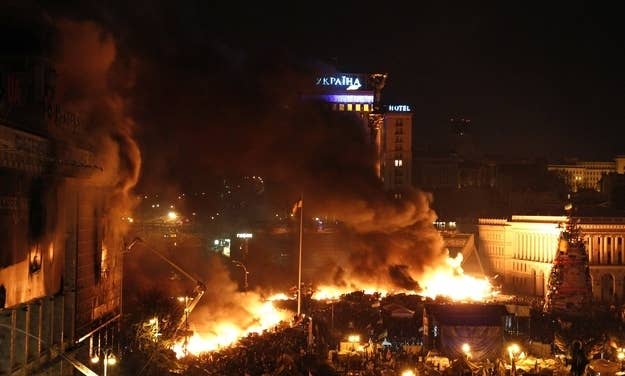
KIEV, Ukraine — As anti-government protesters massed on Independence Square Wednesday night, burning tires and brandishing cobblestones, for what could be their last stand, Ukraine's opposition sees one hidden hand at the heart of the country's deadly political crisis: that of Vladimir Putin, whose pressure on Ukrainian President Viktor Yanukovych to turn from Europe to Russia launched the protests in November and whose imperial designs on a land he once said was "not a real country" are said to drive his every move. On Tuesday night, nationalist leader Oleh Tyahnibok warned of a "Moscow scenario" from the stage set up on the square, also known as the Maidan, shouting, "Who said Putin would teach you to love your motherland?" Yuri Lutsenko, a former interior minister, was even more blunt: "Putin's slaves want to make us all their slaves!"
With dozens dead, no European leader could get Yanukovych on the phone Tuesday night, but Putin spoke with him late into the night. Putin's spokesman, Dmitry Peskov, denied that the Russian president condoned or coordinated the violence. "The president of Russia," Peskov said, "has never and does not give his Ukrainian colleague advice on the subject of what to do or how to do it, and has no intentions of giving such advice in the future." Russian Foreign Minister Sergey Lavrov placed the blame for the clashes, in which 26 people died and nearly 250 were injured, on opposition leaders and Western governments who back them. "Now they're trying to dump all the contents of their sick heads on us," Lavrov said.
Publicly, Russia has insisted since the start of the crisis that it is pulling no strings in Kiev, with Lavrov also decrying the West's "obtrusive mediation" in Ukraine's sovereign affairs. Few here doubt, however, that the Kremlin is the prime mover behind closed doors. Secret meetings with Putin late last year won Yanukovych an emergency $15 billion loan and gas discount to stave off certain default. The Kremlin turned off the tap when he subsequently proved himself incapable of preventing the crisis from escalating a month later. Russia's announcement late Monday that a $2 billion payment would finally resume preceded Yanukovych's sudden lurch from conciliation to the next day's bloody crackdown.
The conditions of Russia's help have not been made public, but they're not hard to guess. One Western diplomat in Kiev called the money a "Russian crack pipe" that has warped Yanukovych — who was all set to sign a deal boosting ties with the EU just months ago — into a cash-flushed power fiend addled enough to ruin anything for another destructive fix. "The Russians are the crack dealer," the diplomat said. "Their aid doesn't involve any effort to heal the macroeconomic situation — it leaves the fundamentals unchanged."
Yanukovych's reliance on Putin for his economic fix has led many Ukrainians to believe that the sudden upswings in state violence (at times, it should be noted, against protesters who cast the first Molotov cocktail) have come by special order from Moscow. The timing of this week's sudden descent into an uncharted abyss — with the Olympics in full swing — makes it seem more likely, however, that Yanukovych is simply acting off Moscow's smoke signals and its own instincts. Kiev is awash with reports that Vladislav Surkov, the man long known as the Kremlin's gray cardinal, has taken up Moscow's Ukraine account and has been sighted around the country. Tactics the opposition accuses the government of, like hiring thugs to pose as protesters and cause violence, certainly take a leaf from his playbook.
Putin's official point man in Ukraine is Sergei Glazev, a former far-right party leader who shot chills up investors' spines when he was floated to take over Russia's central bank a year ago. He openly accuses Western powers of masterminding the violence. In late January, Glazev said that Yanukovych could either "defend Ukrainian statehood and suppress the revolt provoked and financed by external forces, or he risks losing power, and then mounting chaos and internal conflict with no end in sight await Ukraine." A week later, he claimed the U.S. was spending $20 million a week on Ukraine's opposition and training armed fighters on embassy grounds. (BuzzFeed visited twice over the next few days and failed to find them.)
Even by Kremlin standards, Glazev is considered an over-the-top figure: Another diplomat BuzzFeed spoke to in Kiev fondly recalls going to his briefings during an earlier posting in Moscow just to laugh at him. Most here have taken his outsize presence on Ukraine as a sign that Putin considers it a relatively low priority, not the imperial crown jewel of conventional wisdom. Neither hypothesis is encouraging for the protest movement: Either Putin will stop at nothing, or he has nothing to lose. Whatever the stakes, he's backing Yanukovych to the bitter end. Late Wednesday, in a phone call, Putin urged German Chancellor Angela Merkel to stop blaming Ukraine's government for the violence and "harshly criticize opposition forces guilty of organizing illegal, extremist, and terrorist acts."
It was the fullest backing Russia had yet offered Yanukovych, moreso even than the December deal to "buy" him. And if the money emboldens Ukraine's government — which has sounded newly invigorated in renouncing responsibility for the violence and calling protesters "terrorists" — it can also be used to rein it in. Dmitry Rogozin, a bombastic deputy prime minister the Kremlin rolls out to play bad cop, flies to Kiev tomorrow. Reuters reported late Wednesday that Moscow's $2 billion tranche was being held up for "technical reasons." Those are easy to visualize: a square in downtown Kiev, surrounded by security forces and splattered in burning tires and blood.
